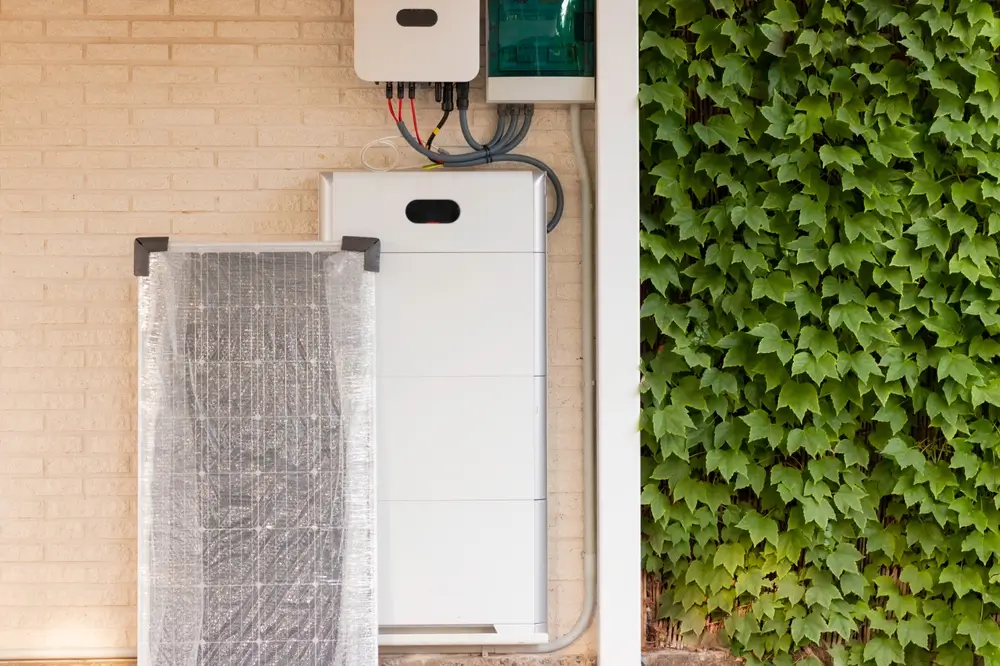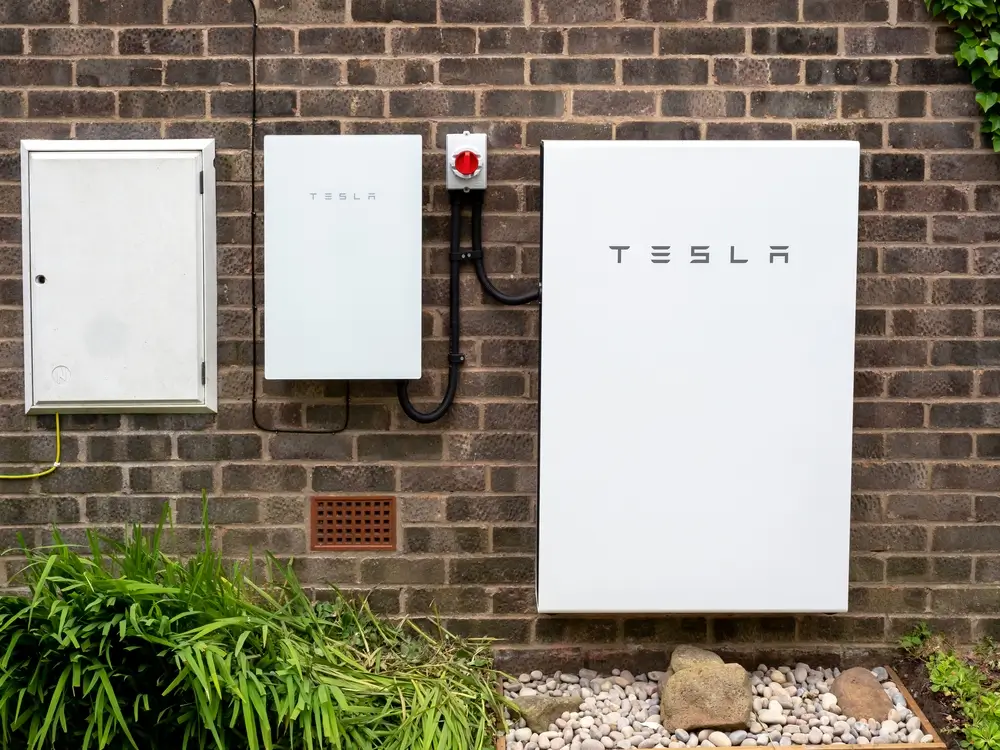Solar batteries serve as integral components in renewable energy—bridging the gap between solar panel production and energy consumption.
These innovative devices play a vital role in maximizing the efficiency and reliability of solar energy systems by storing excess energy generated during sunny periods for use during periods of low sunlight or at night.
Explore how solar batteries work and discover their potential as a sustainable solution.
What Are Solar Batteries?
Solar batteries are rechargeable energy storage systems designed to store excess electricity generated by solar panels during periods of sunlight. These batteries store the energy for later use, ensuring a consistent power supply even when solar panels are not actively producing electricity.
By storing surplus energy, solar batteries enable homeowners and businesses to maximize the benefits of their solar energy systems and reduce reliance on the traditional electrical grid.

How Do Solar Batteries Work?
Batteries for solar panels function through a process of energy conversion and storage, utilizing chemical reactions to store and release electrical energy. During daylight hours, solar panels absorb sunlight and convert it into electrical energy, which is then directed to charge the solar panel battery.
The battery stores this energy in the form of chemical bonds, typically within lithium-ion cells, where it remains until needed.
When electricity demand exceeds solar panel production, such as during nighttime or periods of low sunlight, the solar battery releases stored energy, providing power to the connected electrical system.
Are Solar Batteries Worth It?
The worth of solar batteries depends on various factors, including individual energy consumption patterns, electricity rates, and incentives or rebates available in the area.
For homeowners or businesses with high electricity usage or frequent grid outages, solar batteries can offer significant benefits in terms of energy independence, resilience, and potential cost savings over time.
Additionally, solar batteries contribute to reducing carbon emissions and supporting environmental sustainability by maximizing the utilization of clean, renewable solar energy.
However, it’s essential to conduct a thorough cost-benefit analysis and consider specific circumstances before investing in a solar battery system.
Types of Solar Batteries Available In The Market
Each type of solar battery offers unique characteristics and suitability for different applications.
Lead-Acid
Lead-acid batteries are one of the oldest and most common types of solar batteries, known for their reliability and low cost.
While they have a lower energy density compared to newer battery technologies, lead-acid batteries remain a popular choice for off-grid solar systems and backup power applications due to their affordability and proven performance.
Lithium-Ion
Lithium-ion batteries have emerged as the preferred choice for solar energy storage, offering higher energy density, longer lifespan, and faster charging capabilities compared to lead-acid batteries.
With advancements in technology and declining costs, lithium-ion batteries are widely used in both residential and commercial solar installations, providing efficient and reliable energy storage solutions.
Nickel-Cadmium
Nickel-cadmium batteries are another option for solar energy storage, offering good performance in extreme temperatures and high cycling capabilities.
While they are less common in residential applications due to their higher cost and environmental concerns associated with cadmium, nickel-cadmium batteries are still used in some commercial and industrial solar installations where specific requirements must be met.
Redox Flow
Redox flow batteries are a unique type of solar battery that stores energy in liquid electrolytes contained in separate tanks.
These batteries offer scalability and long cycle life, making them suitable for large-scale solar energy storage applications such as grid-level energy storage and utility-scale renewable energy projects.
While redox flow batteries have higher upfront costs and lower energy density compared to lithium-ion batteries, their flexibility and durability make them an attractive option for certain solar energy storage needs.

How Much Do Solar Batteries Cost?
The cost of solar batteries varies depending on factors such as battery type, capacity, and brand. Generally, homeowners can expect to pay anywhere from a few thousand to tens of thousands of dollars for a solar battery system, but potential savings from reduced electricity bills and available incentives can offset initial costs over time.
How to Select the Best Solar Battery for Your Needs
It is important to consider these factors when you pick a solar battery that suits your requirements.
Use & Need Considerations
Considering your specific energy usage patterns and requirements is crucial when selecting a solar battery. Evaluate factors such as the intended use (backup power or off-grid living) and the need for continuous power supply during outages.
Capacity
Capacity is a key consideration when choosing a solar battery, as it determines how much energy the battery can store and how long it can power your home. Assess your household’s energy consumption and storage needs to determine the appropriate battery capacity for your system.
Safety Considerations
Safety considerations are paramount when selecting a solar battery, as they involve the handling of electrical components and potentially hazardous materials. Look for batteries with built-in safety features, such as thermal management systems and protective enclosures, to minimize the risk of accidents or malfunctions.
Cost
Cost is an important factor to weigh when choosing a solar battery, as it impacts the overall affordability and return on investment of your solar energy system. Compare upfront costs, ongoing maintenance expenses, and potential savings from reduced electricity bills to determine the most cost-effective option for your budget.
Warranty
Warranty coverage is essential for protecting your investment and ensuring long-term reliability. Look for solar batteries with comprehensive warranties that cover defects in materials and workmanship, as well as performance guarantees, to provide peace of mind and assurance of quality.
Benefits of Using A Solar Battery
Discover the advantages of incorporating a solar battery into your renewable energy system to maximize efficiency and sustainability.
Energy Independence
Solar batteries offer energy independence by storing surplus electricity generated by solar panels, allowing you to power your home or business even during grid outages or periods of low sunlight, reducing reliance on the traditional electrical grid and ensuring uninterrupted power supply.
Electric Bill Savings
By storing excess solar energy in batteries for later use, homeowners can reduce their reliance on electricity from the grid during peak hours, resulting in significant savings on their electric bills over time while also providing a buffer against fluctuating utility rates and reducing overall energy costs.
Reduce Carbon Footprint
Utilizing solar batteries to store and use clean, renewable energy generated by solar panels helps reduce reliance on fossil fuels and lowers greenhouse gas emissions, contributing to a cleaner environment and mitigating climate change, making it a sustainable choice for homeowners and businesses alike.
What Are The Best Solar Battery Brands?
When considering the best solar battery brands, several factors come into play, including performance, reliability, and warranty coverage. Some of the top brands in the market include Tesla (Powerwall), LG Chem, Sonnen, and Panasonic. Tesla’s Powerwall stands out for its sleek design, high energy density, and advanced features, such as mobile app integration for monitoring and control.
LG Chem offers a range of lithium-ion batteries known for their durability and efficiency, making them suitable for both residential and commercial applications. Sonnen specializes in smart energy storage solutions, providing innovative features like backup power and grid services integration. Panasonic is renowned for its high-quality lithium-ion batteries, which have exceptional performance and reliability. Ultimately, the best solar battery brand for you will depend on your specific needs, preferences, and budget.
Pros & Cons of Using Solar Batteries
Integrating solar batteries into renewable energy systems offers both advantages and disadvantages that homeowners and businesses should consider. Explore the pros and cons to make informed decisions about incorporating solar batteries into your energy strategy.
Pros of Solar Batteries
- Energy Independence: Solar batteries provide backup power during outages, ensuring continuous electricity supply and reducing reliance on the grid.
- Cost Savings: By storing excess solar energy for later use, homeowners can reduce their reliance on grid electricity, leading to lower utility bills over time.
- Environmental Benefits: Solar batteries help reduce carbon emissions by storing and using clean, renewable energy generated by solar panels, contributing to a greener planet.
Cons of Solar Batteries
- Upfront Costs: The initial investment in solar batteries can be significant, including the cost of purchasing and installing the battery system.
- Limited Capacity: Solar batteries have limited storage capacity, which may not be sufficient to power large homes or businesses during extended outages.
- Maintenance Requirements: Solar batteries require regular maintenance to ensure optimal performance and longevity, adding to the overall cost of ownership and upkeep.
How Long Do Solar Batteries Last?
The lifespan of solar batteries varies depending on factors such as battery type, usage patterns, and maintenance. On average, most solar batteries are designed to last between 5 and 15 years, with lithium-ion batteries typically having a longer lifespan than lead-acid batteries.
Proper maintenance and care, such as regular monitoring of charge cycles and temperature levels, can help extend the lifespan of solar batteries and maximize their performance over time.
How Many Batteries Does It Take To Power A House With Solar?
The number of batteries required to power a house with solar depends on factors such as energy consumption, storage capacity of the batteries, and duration of backup power needed.
On average, a typical residential solar energy system may require anywhere from one to several batteries to meet the household’s energy needs during periods of low sunlight or grid outages.
Consulting with a solar energy expert can help determine the optimal number of batteries needed based on your specific energy requirements and goals.
Planning to Switch to Solar? Contact Construct Sun Today!
Start your journey towards sustainable energy solutions by reaching out to Ethical Solar Group. With our expertise and commitment to excellence, we provide solar solutions to meet your energy needs.
Our team of professionals will guide you through every step of the process, from initial consultation to residential installation and beyond, ensuring a seamless transition to solar power for your home or business.
Ethical Solar Group to explore how solar energy can benefit your home or business and take the first step toward a brighter, cleaner future!






